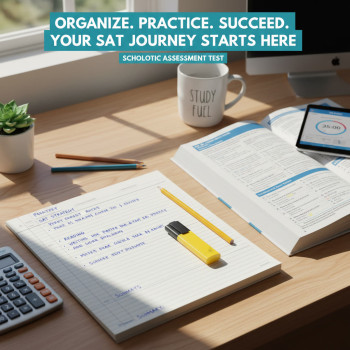Why “Partner, Not Manager” Matters
When the words “SAT prep” start to float around the kitchen table, many parents naturally swing into manager mode: scheduling practice tests, enforcing study hours, tracking every question missed. That impulse comes from love and a desire to help. But the truth is that teens respond best when they feel ownership of their efforts, not micromanaged by well-meaning adults.
Partnering means shifting from control to collaboration — offering guidance, tools, and emotional steadiness while letting your student take responsibility for the learning. The result? Less friction at home, better study habits, and often, stronger performance on test day.

What’s different about the Digital SAT and why parents should care
The SAT has moved to a digital format, with shorter sections, more bite-sized reading passages, and a different navigation experience. For parents, this isn’t just a technical detail — it affects how students practice, what resources are most helpful, and how to develop stamina and test-day routines.
Key differences to keep in mind as a partner (not manager):
- The test is shorter overall but adaptive within sections, so practice should mirror the digital experience.
- There is more on-screen interaction — comfort with a test platform matters as much as content knowledge.
- Score reports look different and offer new insights into strengths and weaknesses, which can shape study plans.
Start with the Relationship: How to Open the Conversation
Before diving into study plans and practice tests, have a heart-to-heart. Your tone at the outset will determine whether your student sees you as a coach or a commander.
Try this simple script as a starting point: “I want to support you while you prepare for the SAT. I don’t want to run the show — I want to help you make choices that feel right for you. Can we agree on how I can help and when I should step back?” This kind of invitation respects autonomy and signals partnership.
Ask open questions, listen more than you talk
Questions that invite agency work best. Examples include:
- “What are your goals for the SAT, and how important are scores to you for applying to colleges?”
- “Which parts of prep feel energizing or frustrating to you right now?”
- “What’s one thing I could do that would genuinely help you study — and one thing I should stop doing?”
Let them answer without interruption. Then summarize what you heard — it shows respect and clarifies expectations.
Practical Partnering: Strategies That Work
Being a partner means creating the conditions for success without running the show. Here are practical ways to do that, with examples you can adapt to your household.
1. Co-create a realistic plan
Sit down together and create a study roadmap that matches your teen’s schedule, energy levels, and college timeline. Keep it flexible: life happens, and a plan that feels too rigid will get abandoned.
- Set a testing target together — not something you impose, but a figure that fits their goals and other responsibilities.
- Break prep into weekly chunks: focused content days, practice question blocks, and a full-length digital practice test every 2–3 weeks.
- Reserve time for mental health, sports, and family life. Teens need rest to learn effectively.
2. Make the practice environment supportive, not controlling
Offer a quiet, comfortable place to study with good lighting and minimal distractions. Ask what small comforts help — a water bottle, a playlist for focused work, or a particular desk lamp.
Resist the urge to sit over their shoulder while they study. If they want accountability, set up a non-intrusive check-in: five minutes at the end of a study block to share one win and one question.
3. Teach time management, not obsession with hours
It’s tempting to equate hours studied with results. Instead, focus on deliberate practice: consistent, focused practice blocks with explicit goals (e.g., mastering linear equations, improving pacing on reading passages).
- Use short, focused sessions (30–50 minutes) with clear objectives.
- Encourage active review: explain mistakes aloud, create flashcards, or teach a concept to a family member.
- Celebrate progress milestones — a faster pacing on practice sections or a higher accuracy on algebra questions — rather than the raw number of hours.
4. Normalize the emotional side of test prep
Anxiety and self-doubt are common. As a partner, validate feelings and offer calm support: “I hear you — this is stressful. What would help right now?”
Teach coping tools: brief breathwork before a practice test, a short walk after a tough study session, or a playlist that signals “transition to focus.” Model a healthy attitude about setbacks: mistakes are data, not destiny.
Make Study Time Smarter: Tools, Tests, and Targeted Help
Supporting effective study is about the right mix of resources, realistic practice, and timely help. You don’t have to be the tutor — but you can help your teen access the best supports.
Practice that mirrors the test
Because the SAT is now digital and adaptive within sections, practice should replicate that environment as closely as possible. Encourage your teen to:
- Use full-length digital practice tests on a device similar to the one they’ll use for test day.
- Practice pacing with the same on-screen tools (calculator availability, answer-review process, built-in time trackers).
- Review score reports to identify content-area weaknesses rather than chasing every point lost.
Table: Sample 8-Week Digital SAT Prep Plan (Flexible)
| Week | Focus | Weekly Activities |
|---|---|---|
| 1 | Baseline & Goal Setting | Diagnostic digital test; set target score; identify 2–3 content priorities |
| 2 | Foundations: Algebra & Pacing | Daily 40-min practice on algebra skills; weekly short digital section for pacing |
| 3 | Reading: Short Passages & Evidence | Practice 3–4 short reading items/day; review missed items for logic and evidence |
| 4 | Writing & Grammar Mechanics | Targeted grammar drills; apply rules in short paragraph editing tasks |
| 5 | Advanced Math Topics | Focus on functions, ratios, and problem solving in context; timed practice |
| 6 | Full-Length Practice & Strategy | One full digital practice exam; detailed review of weak areas; refine pacing |
| 7 | Targeted Drills & Confidence Building | Short targeted reviews; practice stress-management routines; light revision |
| 8 | Final Review & Test-Day Simulation | Full digital practice under test-day conditions; checklist for logistics and sleep |
When to bring in personalized help
Some students thrive on independent study; others benefit from targeted tutoring. Signs that outside help could be useful include persistent gaps in a content area after deliberate practice, lack of motivation despite clear effort, or looming deadlines (like a first official test in a month).
Sparkl’s personalized tutoring can fit naturally here: if your teen needs 1-on-1 guidance, tailored study plans, expert tutors, and even AI-driven insights to track progress, a short tutoring engagement can accelerate growth and build confidence. Choose the help that lets your teen set learning goals — tutors are partners too, not replacements.
Communication Habits That Keep Stress Low
How you communicate matters more than how much you communicate. Small adjustments in language and timing can preserve your relationship and keep study momentum steady.
Language that empowers
- Replace “You must” with “What would help you feel ready?”
- Replace performance pressure with process praise: “I’m impressed by how you analyzed that problem.”
- Use curiosity: ask about their thinking rather than correcting immediately.
Set non-negotiables, then be flexible
Decide together on a few non-negotiables: maybe a weekly practice test, a rule that study time starts after chores, or a limit on phone use during focused sessions. Keep the rest adaptable so students can learn to manage their own time.
Keep feedback specific and actionable
When offering feedback, be specific: instead of “You didn’t study enough,” try, “I noticed you had trouble with pacing on passage 4. What if we focus on two pacing drills this week?” Specificity leads to plans and improvement; vagueness breeds defensiveness.
Test-Day Partnership: Logistics and Calm
On test day, parents can be invaluable logistics managers — without crossing into micromanagement. Your job is to remove friction so your teen can focus on performance.
Checklist for a smooth test day
- Confirm device requirements and that the testing app is installed and updated (if applicable).
- Pack a comfort kit: allowed snacks, water, a backup charger, and a sweater for changing room temperatures.
- Plan travel so arrival is 30–45 minutes early; avoid last-minute stressors.
- Have a simple post-test celebration planned — pizza, a walk, or a family treat — to acknowledge effort regardless of score.
When your teen is nervous
Offer brief, calming reminders: “You’ve prepared for this. Focus on one question at a time.” Avoid pressure to predict outcomes. Your steady presence and a calm ride to the test center can make a huge difference.
Interpreting Scores Together: Use Data, Not Drama
After the test, score reports provide richer data than ever. Treat the first set of scores as diagnostic information, not a verdict. Together, you and your teen can interpret results to guide next steps.
Three constructive next moves
- If scores meet goals: celebrate and discuss whether to retest for a marginal improvement or focus resources on applications.
- If scores are close but below target: identify specific weak areas and consider short-term tutoring or a focused practice block.
- If scores are far from goals: step back to reassess timeline, resources, and stressors. Personalized tutoring and structured practice can create large gains when targeted correctly.
Parent Pitfalls to Avoid
Even with the best intentions, some behaviors commonly derail progress. Watch out for these traps:
- Micromanaging every study session — it undermines independence.
- Using scores as identity statements — avoid phrases like “We need to fix this” that imply failure.
- Comparing your child to peers — every student has a different trajectory and different colleges with different score expectations.
Concrete Scripts for Common Moments
Here are short, ready-to-use lines you can adapt. Keep them simple and sincere.
- When they stumble on a section: “That was a tough set. Want to walk through one question together or take a break?”
- When they resist practice: “I hear you. If you did 30 minutes today, would you prefer to do it now or after dinner?”
- When scores are disappointing: “I’m proud of the effort you put in. Let’s look at the report and pick two concrete things to work on. Want my help finding practice for those?”
When to Step Back and Let Professionals Help
Parents are not supposed to be tutors, and that’s okay. If your teen needs technical instruction, pacing strategies, or motivational support they won’t take from you, bringing in a tutor is a healthy choice.
Sparkl’s personalized tutoring is one option that can fit naturally into a partnership model: expert tutors provide 1-on-1 guidance, tailor study plans to the student’s diagnostic performance, and use AI-driven insights to highlight progress. Think of tutors as your teen’s coach while you remain their steady home support.
Final Thoughts: Partnership Is a Skill You Build Together
Being a partner rather than a manager doesn’t mean stepping away. It means doing the things only a parent can do well: create safety, help set realistic structures, and hold the emotional temperature of the household. It means applauding effort, normalizing setbacks, and celebrating growth — even incremental gains.
Your teen’s SAT journey is also a practice run for adulthood: time management, self-advocacy, and resilience. Help them practice those skills by modeling partnership: check in, listen, and then let them carry the work. When testing season is over, you’ll both have learned something valuable about how you can work together.

Quick Reference: Do’s and Don’ts for Parents
- Do set a collaborative plan. Don’t dictate every study minute.
- Do encourage realistic, focused practice sessions. Don’t equate hours with progress.
- Do provide stress-management tools. Don’t punish mistakes — use them as learning data.
- Do consider expert tutoring when needed. Don’t try to be the sole content expert unless you are trained and invited to help.
A gentle closing
The road to college is long, and the SAT is only one mile marker along the way. If you stay curious, patient, and collaborative, you’ll not only increase the odds of a good outcome on test day — you’ll help your teen build skills that last far beyond any single exam. Partner with them, trust them, and celebrate the work they do. That’s the best kind of support a parent can give.
If you and your student want tailored support — from identifying weak spots in diagnostic reports to building a personalized study plan and getting 1-on-1 guidance — consider exploring personalized tutoring options that keep your teen in the driver’s seat while offering expert coaching, like Sparkl’s approach. It’s a natural complement to strong parental partnership.













No Comments
Leave a comment Cancel